Mario: With this last week, bring the first taste of the new Spring season (or in my case, Fall season) and a lot of finale on Winter season’s shows. Sorry for the delay but I decided to finish Kuutei Dragon first to include it here. Other writers have already done a good job of giving our thoughts on the Winter season’s shows. For me, it’s Eizouken and Dorohedoro that are leagues above the rest, but other shows like Kyokou Suiri and Kuutei Dragon still are still worth the time. I still need to finish my own blogged show Jeweler Richard (yeah it will come) and Blade of the Immortals, but for now enjoy one last breath of cold Winter before we all head to the new Spring season. Enjoy.
Oshi ga Budokan – 12 (end)
Wooper: OshiBudo began its life as a satire of the idol genre – that was the impression I got, anyway, after its premiere demonstrated a willingness to mock its obsessive protagonists. After a few more installments, though, that facade gave way to a straightforward celebration of idol culture and consumption. There was a joke this week about idols not using the bathroom, which would have felt equally at home in the first episode (poking fun at purity expectations) as it did in this one (unironically espousing puritanical values). Images of Eripiyo juggling stacks of CDs, once viewed as pitifully excessive, verged on heroic in the last leg of the story. You can even put aside any tonal interpretations and look at this episode’s subtitles to see where the show’s values ended up. “I’m so happy that I’m an idol.” “The world of idols is huge, but I’m so happy that [name] is my favorite.” If the idol sphere is really such a big deal, why not write a story that depicts it as such, instead of making shallow purchases and handshake events the climactic moments of so many episodes? I’m sure there’s a good idol show out there somewhere, whether past or future, but this wasn’t it.
22/7 – 12 (end)
Mario: Out of all the finale this week, I was eagering for 22/7 the most, given how it wraps up will justify the whole season. In the end 22/7 can’t make up its mind on what it wants to be. It’s uneven in every sense of the words, both have some cynical views on the idol industry, but at the same time gives it exactly what we want as the girls get together and become independent from the Wall’s order. It’s a mixed bag but this finale does have some sparks of brilliance, so to highlight its inconsistency I will rate its moments from scale 0 point to 10 points, with 0 being the worst and 5 as the average. Spoilers ahead so skip it if you don’t want to get yourself spoiled. Let’s go:
0: Please ugly CG dance please go away!!
1: I don’t know what to make of this totally-unnecessary ending featuring 3 new girls for no apparent reason. Is it just a blatant marketing?
Offtrack: By the way, I have a theory about the meaning of their name 22/7. 22/7 is the approximation of pi number, and pi number is like one of the most famous constant numbers that is referenced frequently in popular culture. These girls might represent different distributed digits, as they have different personalities that all contribute to the pi number – the band itself. I might just get ahead of myself though.
2: After 22/7 team members technically tear down the Wall, it still gives orders? As obscure as this? The revelation that this is all part of the Wall’s masterplan is total BS to me.
3: Nicole bows down to apologize to the Wall for all the shit it did. While Miu (rightfully) immediately disapproves of this action, it ties back to Reika’s early episode where she apologized for feeling uncomfortable wearing swimsuits, which is the PERFECTLY valid concern she experienced.
4: While the main plot is resolved, there remains many unresolved subplots. Case in point, Sakura and her subtly-but-we-all-know-it queerbait to Miu. Seriously though, remember the cliffhanger in her own episode where she can only be an idol for a year? What happens to that?
5: The moment where the girls realize they are on stage with fans waiting is this finale’s climax, and I can say it’s earned the emotional buildup. BUT by doing so it’s a fair bit disappointing that 22/7 the anime goes for a safe and familiar route. In addition, the overall message of these girls growing to stay independent from the Wall’s manipulation as part of the Wall’s grand scheme is a bit self-contradicting, isn’t it?
6: The unsung unnecessarily-muscular hero behind the scene. It’s a manly tear, I swear!
7: Miu breaks down that damn Wall. Yay!!! The most satisfying moments of the whole season!!
8: That scene where the girls are inside the Wall bathed in red hue is sooo bizarre and out of context of normal idol shows it’s actually inspiring. It reminds me strongly of Mamoru Oshii’s cyberpunk settings (yeah, beats me) and damn, who else is interested to find out what this room is about and the person behind all this?
9: The corridor walk in the dark moment that will make David Lynch proud and it keeps up the suspense on what exactly lies behind the door. The result might be a letdown but for a moment it’s the Lynchian surreal to the unknown that fully grabbed my attention
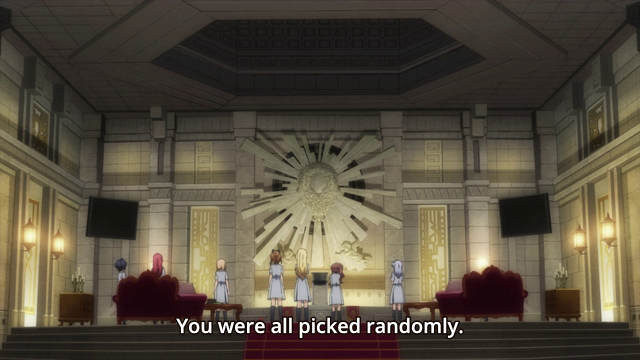
10: This line could very well sum up its cynical view to idol shows and serves as a reconstruction to the idol genres, or any “chosen ones” hero story as a whole. The girls work their ass off and are willing to be manipulated by the Wall because they think they are the special ones chosen for this project. Turns out the Wall is a massive jerk and chooses them randomly for sports? Now that’s thought-provoking and it could be a whole totally different and awesome anime if 22/7 makes full use of this cynical idea. It’s a shame that they instead settle on a much more conventional ending.
Somali to Mori no Kamisama – 12 (end)
Mario: Somali ends on the right note as Golem’s body deteriorates and he wants to leave Somali, but ends up staying with her anyway. It’s the third arc we’ve been anticipating since the first episode, so I can’t say that this ending offers anything new. In the end, Somali is an enjoyable, if a bit one-noted show and its heart is in the right place. Sadly it’s not the one that I find myself coming back to often.
Jibaku Shounen Hanako-kun – 12 (end)
Mario: Jibaku has a very solid ending for this season, a finale that features the entire cast and gives the central relationship between Hanako and Meme a necessary test. I like the way all the supporting cast contributes a little to this, but it’s unabashingly about Meme’s feelings towards Hanako. As a whole, I am mixed with the show. It has an unique art style with soft but appealing color scheme, and I enjoy the supernatural aspect of the show as it ties the rumors and apparitions in an interesting way, but the comedy doesn’t land well and I don’t care one bit for any of the characters, making it difficult for me to engage with their journey. There’s a high chance that this one will get a sequel, considered how popular the manga is, but this serves as a perfect stopping point for me and I wish it all the best.
Kuutei Dragon – 7-12 (end)
Mario: Oh boy, how having little to no expectation can somehow elevate the experience as I’m constantly pleasantly surprised on how much I enjoy the show. It’s the same feeling as when I watched ID-0 a few years back, another full CG show that no one watched (maybe I do have a thing for low-budget jerky full CG shows). The second half eschews the episodic format of its first half, and focuses on two main story arcs, which for me work much better. Several characters have their different roles in the story, meet new interesting characters and have their own conflicts to face. I also appreciate the way the show never dumps any new information about its settings or character background at us, but instead lets it grow naturally and we learn to pick up their personality traits and different customs entirely through their chemistry. Additionally, it’s remarkable that with the cast this large without much of background details, each character is distinct from one another to the point I don’t have any problem picking them apart at all despite just a month or so gap. I love the characters, love their journey and overall I have a pretty swell time with it.



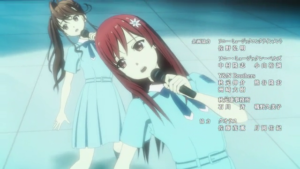
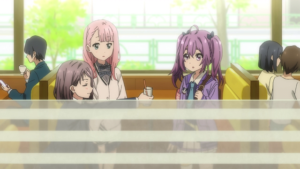
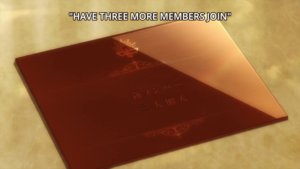
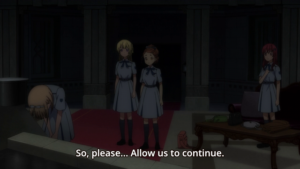
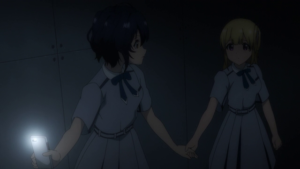
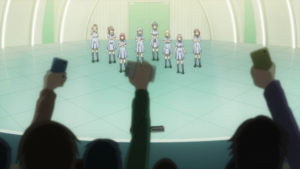
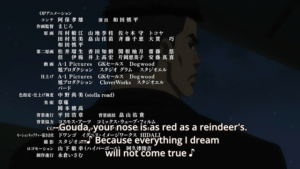
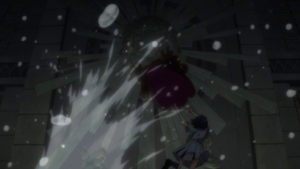
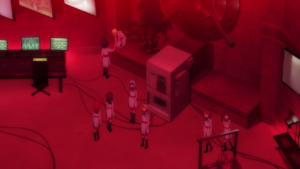
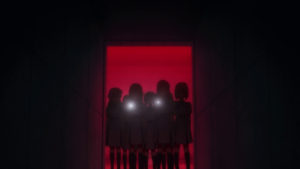
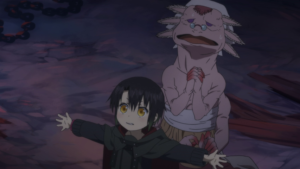
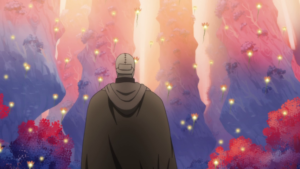
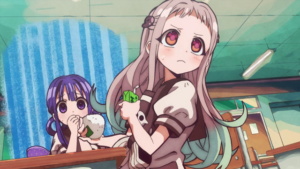
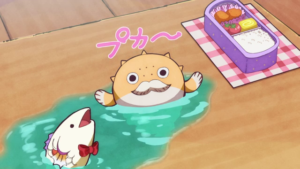
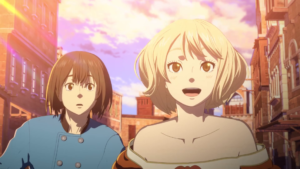
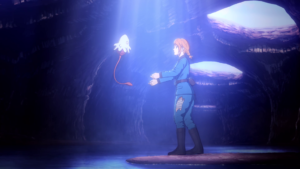
Yeah, I didn’t like 22/7’s ending as well. At least explain who was behind the Wall and how it managed to get photos of all the girls as far back as their early childhood (Which, you have to admit, is not only creepy, but it just raises further questions)! I mean, come on! How can you not resolve something as important as that?! The room behind the Wall itself implies a bunch of people might have created the Wall and were doing stuff behind the scenes the whole time, and you’re not even gonna address that?
Oh, and speaking of Reika’s poorly written episode with the bad message, I wrote a fan fic that rewrites the ending to said episode: https://archiveofourown.org/works/23260786
I just read your fan and and it indeed gives a more satisfying development to the one we had. Well done, Firechick. Also bravo to the fact that you were passionate about the unfair treatment of Reika enough to write about it.
By the time OshiBudo went from seemingly satirizing idol culture into full-on yuribait that other idol shows keep dabbling in, yeah… that’s where my worries started coming in.